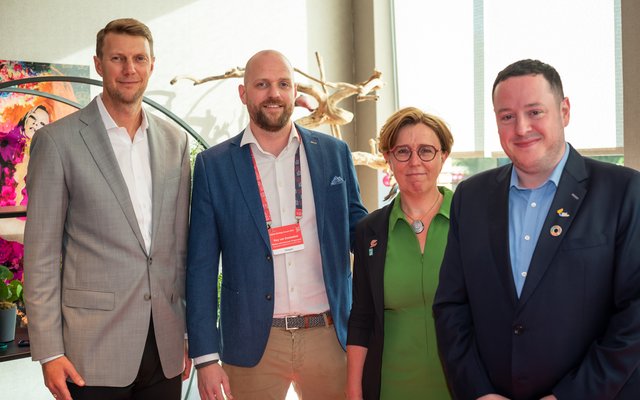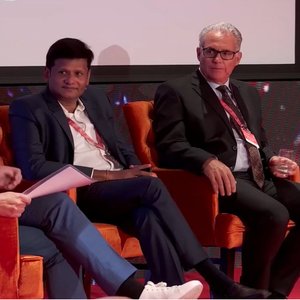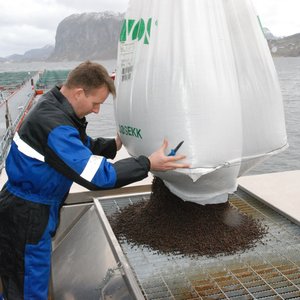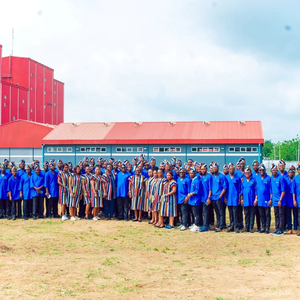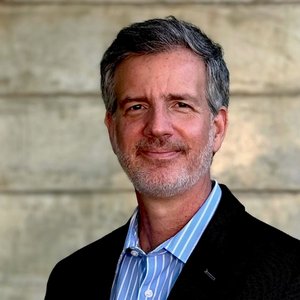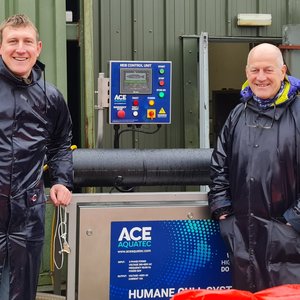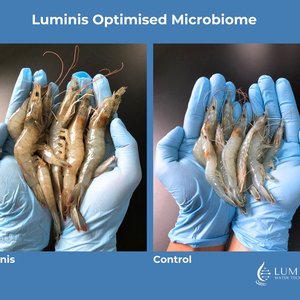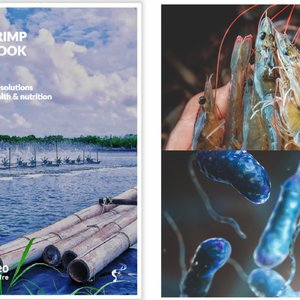Following successful pilots in different countries, the Aquaculture Stewardship Council (ASC) launched at the Global Shrimp Forum a new framework for credible Aquaculture Improvements Projects (AIPs) under the ASC Improver Programme.
ASC’s mission is to transform the aquaculture industry towards environmental sustainability and social responsibility. However, not all aquaculture producers are able to meet ASC’s robust and strict standards' requirements. For this reason, ASC created the Improver Programme. The program supports farms that are not ready for ASC certification but are committed to improving their farming practices. “The AIP is an additional instrument for us to drive more change, especially with smaller producers,” Roy van Daatselaar, ASC Global Lead Improver Programme, told Hatchery Feed & Management at the Global Shrimp Forum.
How does it work?
Producers can choose one of two tracks for their AIP. The first is through the AIP to ASC certification route, where a plan of four phases is defined to improve the performance of the farm to a level that would allow the producer to apply for the ASC certification by the end of the AIP. The second is the AIP to Better Practices route which is set out to facilitate producers who do not wish to become ASC certified but still want to implement responsible practices and improve on specific environmental or social areas.
For the first route, each AIP starts with a baseline measurement including a gap analysis and a time-bound project plan of a maximum of three years. “We take the 122 indicators of the ASC Shrimp Standard at the point of entry. A number of eligibility requirements already need to be met by the farm and we measure how many still need to be implemented to fully comply with the standard. These remaining requirements are then grouped into four phases which, over the course of the program and within three years, will need to be met,” van Daatselaar explained.
“For farms that don't want to become ASC certified but still want to make meaningful and measurable improvements, we have separated the standard into different modules. Farmers can pick a number of modules and use these to define their AIP targets. This allows us to measure performance and progress in the same way as the AIP to ASC certification,” he said.
Within the developed framework, ASC designed two specific roles working with an AIP: implementers and verifiers. “We, as ASC, train implementers that are local organizations with technical capacities to help farmers on a daily basis. Implementers are responsible for conducting the gap analysis, developing the improvement plans, conducting training and capacity building with farmers and conducting a progress report at the end of each improvement phase. At the end of each phase, there is an independent verification taking place by a verifier, who is also trained and qualified by the ASC,” explained van Daatselaar.
ASC covers the costs of verification. “To obtain ASC certification, investment is needed and, on the path to certification, we want to be aware that we are offering something valuable rather than confronting farmers with more costs. We have ambitions to grow the program and, as an organization that aims to make an impact, we should be able to free up resources to support the industry,” van Daatselaar stated.
Progress needs to be reported on a regular basis and all this info will be public on the ASC website under the Find an AIP search tool. “We will publish the progress of each AIP on our website so the market can see if the producers are moving in the right direction,” van Daatselaar explained.
The AIP is open to big and small-scale farmers, but it is naturally more tailored to smaller producers that usually have more challenges to meet the ASC requirements. ASC is also working with local implementers to adapt the program to be applicable in a local farming context.
Currently, ASC offers support and facilitates AIPs for shrimp and, following the launch of the ASC Farm Standard in 2024, other species will be included in the scope too.
Successful pilots
The first pilots were conducted in Indonesia with three medium-sized intensive shrimp farms, supported by PT BMI, Sekar Bumi and JALA, which have all taken part in an AIP to ASC certification.
“Farmers who are used to working with certifications are relatively quick in adapting to the requirements. Other farms struggle with more basic challenges on good farm management practices and may require more day-to-day support from the implementer to meet improvement targets,” van Daatselaar explained.
“From the pilot in Indonesia, we learned a lot about the crucial and complex role of the implementer, in this case, Yayasan Sinergi Sustain Aqua Indonesia (YSAI). The implementer has to act both as a practical and technical extension to the farmers to support implementing improvement actions but also has to have an auditor perspective to help the farmers understand how to demonstrate compliance against the standard requirements. It took us a while to develop the right training materials and assets to support the capacity building at the implementer level, but we are very pleased with the level of competence and delivery in the AIP,” van Daatselaar said.
Additionally, ASC piloted an AIP with Lenk Seafood Services and Luna Seafoods, which are working with 125 extensive monodon farmers in Bangladesh and are implementing ASC Group Certification following an AIP. “Farmers need to implement not only the standard requirements, but also additional requirements for group certification which is the real heavy lifting in this project. Fortunately, there is a strong commitment and capacity from the local implementers and partners to deliver on this AIP. The AIP farmers in Bangladesh operate in very rural communities and the supply chain needs to be professionalized and upgraded, therefore, the potential positive impact of the program in socio-economic terms is high,” van Daatselaar said.
Future prospects
ASC aims to scale up its portfolio in the coming years and offer support to AIPs in Southeast Asia and Latin America while exploring with partners such as World Wildlife Fund (WWF) and Sustainable Fisheries Partnership (SFP) how improvement efforts can be driven in the wider landscape and at the jurisdictional level. It already secured seafood leader Thai Union as one of its first partners to implement ASC’s AIPs for a total volume of 15,700 metric tonnes of shrimp by 2026.
But how difficult is it to get farmers engaged? “For farmers that don’t need market certification, the question is what the value proposition is for them, for example, in terms of cost saving or yield improvement. We are planning to work with partners to develop standardized training packages to help, at least in a very basic way, farmers with improved farming practices. Small farmers are often the more marginalized actors in the value chain, so we are trying to keep it very farmer-centric to create value directly for them,” van Daatselaar stated.
“We are offering this transparent tool to the industry and markets that are already working with ASC will be more adaptable to understand that AIPs are creating a pipeline for future certification. It is important for certification schemes to show their impact and be transparent. Developing the AIPs is the logical next step because in order to have conversations about what fair equitable share of responsibility and investments might be needed, we need to have the details on the table for all the actors in the value chain. It’s not only about certification and the benefits provided to the marketplace, but it’s also about creating value for the farmers,” van Daatselaar stated.
“The launch of this framework for credible AIPs, together with the support and investment that ASC aims to provide to the sector, will be a game changer to the industry,” said van Daatselaar. “Processors and seafood importers can now start an AIP within their supply chain and receive direct support from the ASC in the form of capacity building. Retailers and seafood buyers can now go to our website and see how AIPs are progressing, following independent verification and transparent reporting on progress.”
Producers can now apply to enter the program and receive support to improve their farming operations. ASC welcomes applications from shrimp farmers interested in participating in an AIP anywhere in the world. Interested stakeholders can contact the ASC Improver Programme team at aipservice@asc-aqua.org.


